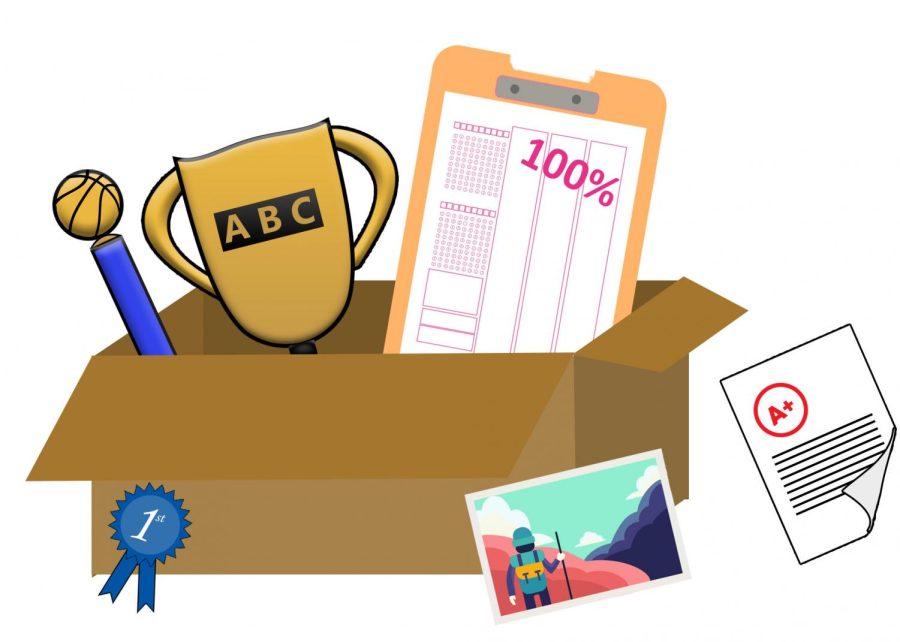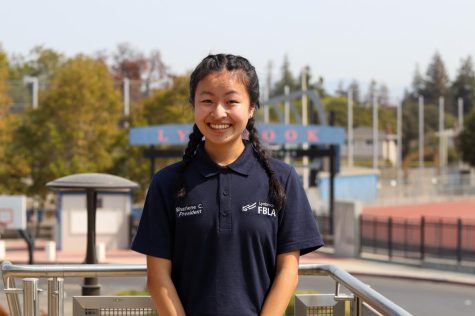Consequences of college packing
Graphic illustration by Opinion Section
In the box and around it lie a variety of materials that students use to prepare for college applications.
January 29, 2020
As a result of Lynbrook’s competitive atmosphere, students often look for ways to build a promising resume. Many choose to participate in college “packaging” programs offered by various counseling services. Despite the allure of a single program resolving the struggle to craft a convincing resume, these programs reduce the individuality of students and decrease their chances of getting into their dream college.
One of the opportunities provided by these college “packaging” services is to send students on trips costing thousands of dollars to remote, impoverished countries to help build a school in exchange for community service hours. Or, students may present a speech in front of a few people and receive an “International Speaker” award. These services sometimes even assist students in creating clubs outside of school that only have a few members, so students can claim to be the presidents of numerous clubs. However, all of these are purely superficial titles that do not benefit the student. Oftentimes, students and parents harbor the misconception that if they do certain things the way their friend or relative did, they can easily get into the same college. Consequently, many of the applications that admissions officers review look identical.
In reality, diversity among students is important, as colleges typically choose applicants who showcase their unique talents and experiences.
“Admissions officers really care about the students for whom they advocate, but often it comes down to the needs of the school and the desire to have a well-rounded incoming class,” said Natalia Ostrowski, Former Assistant Director of Admissions, University of Chicago, in an article for Business Insider.
When students jump to the conclusion that the only way to be admitted to their dream college is to participate in college “packaging” services, they are actually doing the opposite and reducing their chances. These services prepare everything for the student in advance, meaning that the students do not have the opportunity to learn the lessons that come with organizing or managing their supposed achievement; even if the program did aid their chances, it does not help them learn the skills for future successes. Further, the student’s intentions are completely misplaced: they focus on their own individual status instead of improving the world and society. When college admission officers pick applicants, they do not just look at a list of achievements—instead, they want to see how the student has developed as a person and what he or she could contribute to the school.
“Just doing activities because someone’s telling you ‘do A, B and C to stand out’ is not the way,” said guidance counselor Malissa Goldstein. “They are probably giving that same advice to every student whom they meet with. Then again, if you’re not interested, it’s not as genuine.”
However, joining an outside college counseling service can be beneficial for some students. Some counselors can help students determine what is suited for them and provide them with personalized advice for the direction they would like to follow.
“My service HS2 gave me some freedom to choose my path in high school, which I’m very thankful for, as I’ve heard of services that micromanage students for an expensive price,” said Helen Sun, a Lynbrook alumna and sophomore at the University of Illinois Urbana-Champaign.
Regardless, students should be aware that plenty of resources are already available at Lynbrook and FUHSD, free of charge, such as various meetings, workshops and classes.
“We offer individual appointments to students and parents when they need assistance with college planning information,” Goldstein said. “The district provides college planning and essay workshops, beginning in the spring of the junior year and summer and fall of senior year. For seniors specifically, we will read essays and provide feedback as often as students need. Some mini workshops try to help students really focus so they target how to write that essay for engineering schools.”
Applying for a college is not simply a checklist that once filled, guarantees a student a spot. Every student is different. When they join these programs, they effectively erase traces of themselves, since everyone else is already doing the same exact thing.
“I don’t think there is a recipe to be an optimal candidate. If everyone tries to become optimal through resumes and gpas it becomes a bit monotonous for colleges,” said Daniel Cai, a Lynbrook alumni and freshman at Boston University. “Colleges want a diverse population so the student body can develop their perspectives through exposure.”
In the end, college admissions is a complicated process to understand. Participating in a college “packaging” program will make it even more confusing and difficult. Just because someone does not get into an Ivy League school or their dream college does not mean that they have ruined their future. College is only the beginning of a long path. High school students should focus more on their growth during these eventful four years instead of forcing themselves to become someone they are not for the sake of their resume.




































































